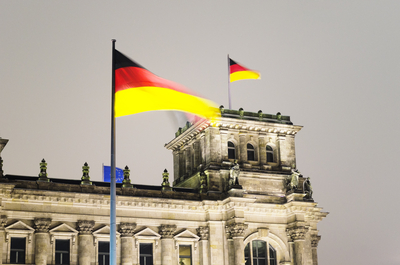The German Defeat

The 1919 Treaty of Versailles
From 1918-1920, with the defeat of Germany in World War I, the nation was forced to accept a series of devastating reparations after signing the Treaty of Versailles.
The treaty had stipulations to disarm the government. The defeated government agreed to payments it did not have the ability to make, which would eventually lead to the 1920s inflationary depression. Fearing inability to hold the state together during the depression, the German government adopted a sweeping series of gun confiscation legislation against the citizens prior to completely disarming the German military.
Article 169 of the Treaty of Versailles explicitly targeted the state: "Within two months from the coming into force of the present Treaty, German arms, munitions, and war material, including anti-aircraft material, existing in Germany in excess of the quantities allowed, must be surrendered to the Governments of the Principal Allied and Associated Powers to be destroyed or rendered useless.
In 1919, the German government passed the Regulations on Weapons Ownership, which declared that "all firearms, as well as all kinds of firearms ammunition, are to be surrendered immediately." Under the regulations, anyone found in possession of a firearm or ammunition was subject to five years' imprisonment and a fine of 100,000 marks.
On August 7, 1920, rising fears whether or not Germany could have rebellions prompted the government to enact a second gun-regulation law called the Law on the Disarmament of the People. It put into effect the provisions of the Versailles Treaty in regard to the limit on military-type weapons.
In 1928, after a near decade of hyperinflation destroyed the structural fabric of the society, a rapidly expanding three-way political divide between the conservatives, National Socialists, and Communists prompted the rapidly declining conservative majority to enact the Law on Firearms and Ammunition. This law relaxed gun restrictions and put into effect a strict firearm licensing scheme. Under this scheme, Germans could possess firearms, but they were required to have separate permits to do the following: own or sell firearms, carry firearms (including handguns), manufacture firearms, and professionally deal in firearms and ammunition. This law explicitly revoked the 1919 Regulations on Weapons Ownership, which had banned all firearms possession.
The 1938 German Weapons Act
The 1938 German Weapons Act, the precursor of the current weapons law, superseded the 1928 law. As under the 1928 law, citizens were required to have a permit to carry a firearm and a separate permit to acquire a firearm. Furthermore, the law restricted ownership of firearms to "...persons whose trustworthiness is not in question and who can show a need for a (gun) permit." But under the new law:
- Gun restriction laws applied only to handguns, not to long guns or ammunition. The 1938 revisions completely deregulated the acquisition and transfer of rifles and shotguns, as was the possession of ammunition.
- The legal age at which guns could be purchased was lowered from 20 to 18.
- Permits were valid for three years, rather than one year.
- The groups of people who were exempt from the acquisition permit requirement expanded. Holders of annual hunting permits, government workers, and NSDAP members were no longer subject to gun ownership restrictions. Prior to the 1938 law, only officials of the central government, the states, and employees of the German Reichsbahn Railways were exempted
- Jews were prohibited from possessing any dangerous weapons, including firearms. They were also forbidden from the manufacturing or dealing of firearms and ammunition.
Under both the 1928 and 1938 acts, gun manufacturers and dealers were required to maintain records with information about who purchased guns and the guns' serial numbers. These records were to be delivered to a police authority for inspection at the end of each year.
On November 11, 1938, the Minister of the Interior, Wilhelm Frick, promulgated Regulations Against Jews' Possession of Weapons. This regulation effectively deprived all Jews living in those locations of the right to possess firearms or other weapons.
Current Laws

After 1945, even German police officers were initially not allowed to carry firearms. Private ownership of firearms was not allowed until after 1956. The legal status returned essentially to that of the Law on Firearms and Ammunition of 1928. The regulation of the matter was thoroughly revised in 1972, when the new restrictive Federal Weapons Act (Bundeswaffengesetz) became effective, partly as a reaction to the terror of the Red Army Faction.
Germany experienced a rather rapid increase in the availability of guns in the early 1990s. It was partly a result of demoralized Soviet troops in the eastern part of the country selling their weapons to the German population, and partly to the underground market.
It is interesting to observe that during exactly this period of increased gun availability, violent crime involving guns increased considerably from 4,000 cases in 1990 to 7,700 cases in 1993; homicides involving guns increased by fifty percent, from 224 cases in 1990 to 314 cases in 1993.
The 1972 law was developed in the Federal Weapons Act of 2002 and by amendments in 2008 and 2009. These laws were the result of a chain of school shootings in Erfurt, Emsdetten and Winnenden. They led to a public debate, in which blame was attributed to various elements of youth culture and society, including violent computer games, television programs, rock music and private gun ownership.
In general, Germans may posses firearms, including semi-automatic handguns/rifles. There are restrictions on the weapon’s caliber, barrel length and brass size. Everything larger than 20mm–20mm comes within German “War Weapons Control Act”—is considered unlawful for private users. To possess a firearms, an individual needs must provide the state with a reason why they want to buy, own and shoot a particular gun. This can be: sport shooting, hunting or collector/surveyor (the rarest form of gun ownership). There are different requirements to receive permission for each use: Sport Shooting, Hunting, and Collecting.

Concealed Carry
The right to bear firearms in public is much more restrictive. It is so restrictive that, in fact, only 30,000 out of 80 million people own the right to bear firearms in public. It is limited, for example, to very prominent figures who can make a claim that their lives are in danger. It is also limited to members of certain occupations, such as guards of money transports.
So there is a very small number of people who walk around with guns in public. In general, a legal gun owner may not receive a Concealed Carry (CC) permit. The government only grants a CC is to people in serious danger of bodily harm of kidnapping, regardless of their status as hunters, sport shooters, collectors or none of the above. Needless to say, politicians at state level are automatically allowed a CC permit.
Again, as a “normal citizen” you have to establish that you in terrible danger. Being shot more than one time is considered adequate proof that you qualify.